教学课件 --冀教版中学英语七年级(下) UNIT5 Lesson28
文档属性
| 名称 | 教学课件 --冀教版中学英语七年级(下) UNIT5 Lesson28 |
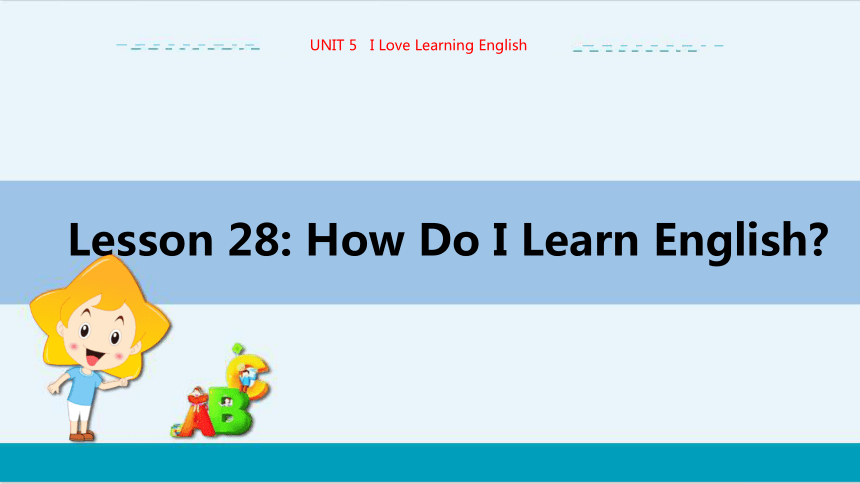
|
|
| 格式 | pptx | ||
| 文件大小 | 1.4MB | ||
| 资源类型 | 试卷 | ||
| 版本资源 | 冀教版 | ||
| 科目 | 英语 | ||
| 更新时间 | 2024-02-21 19:48:13 | ||
图片预览

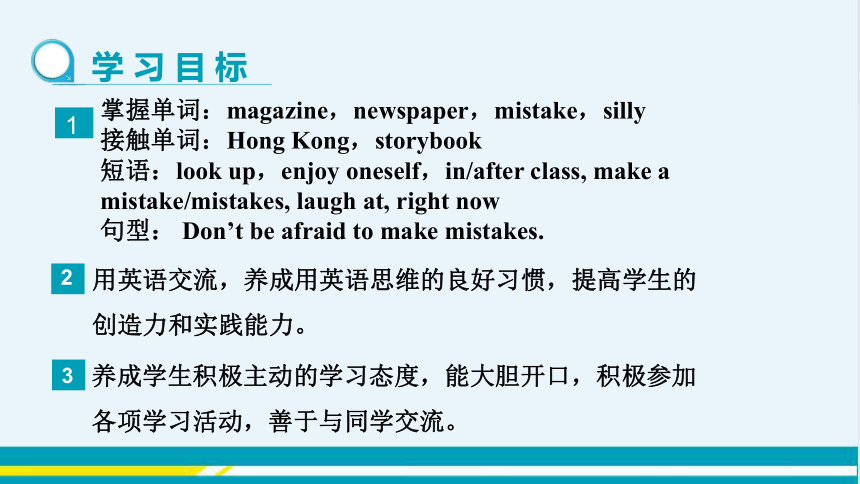
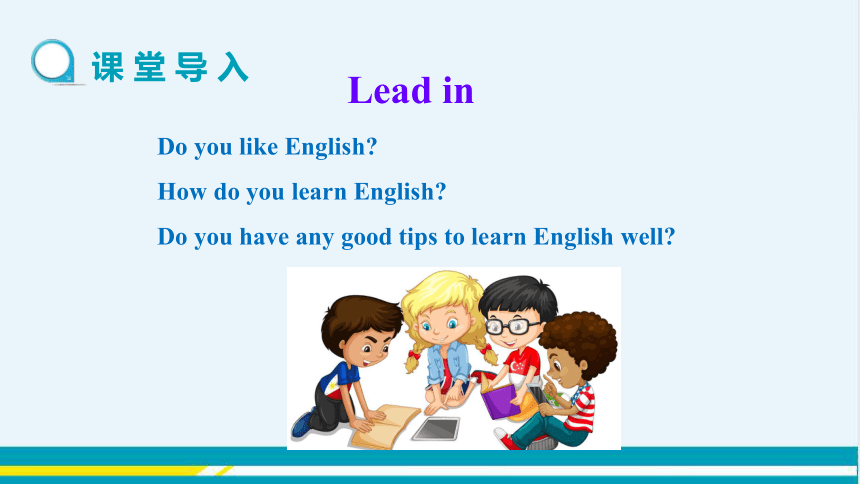
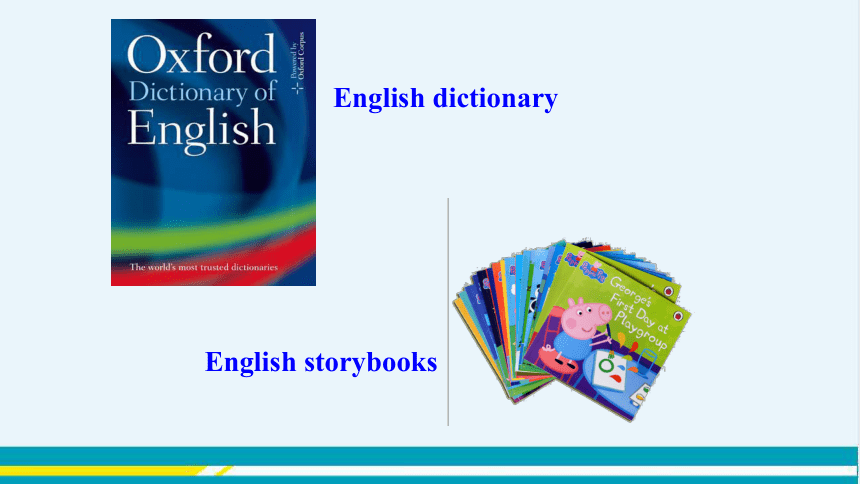
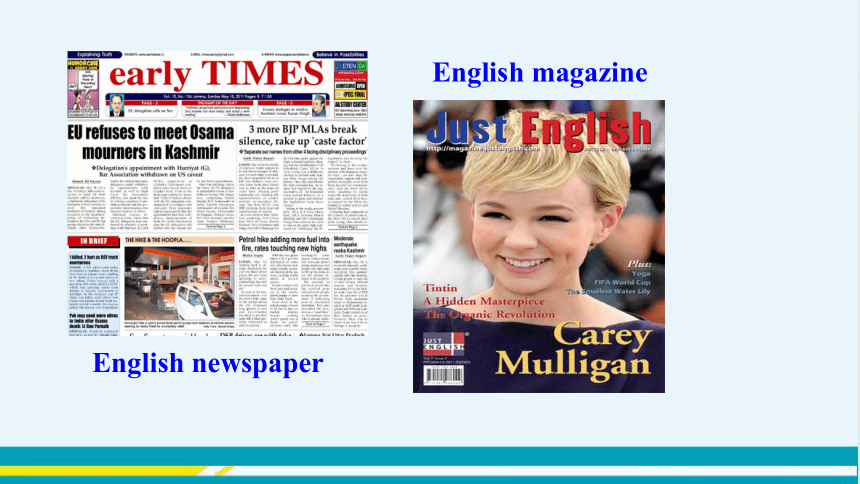
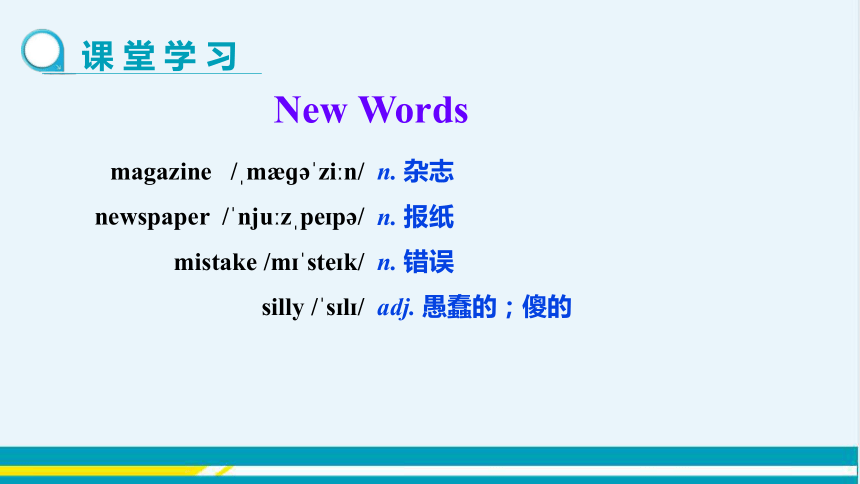
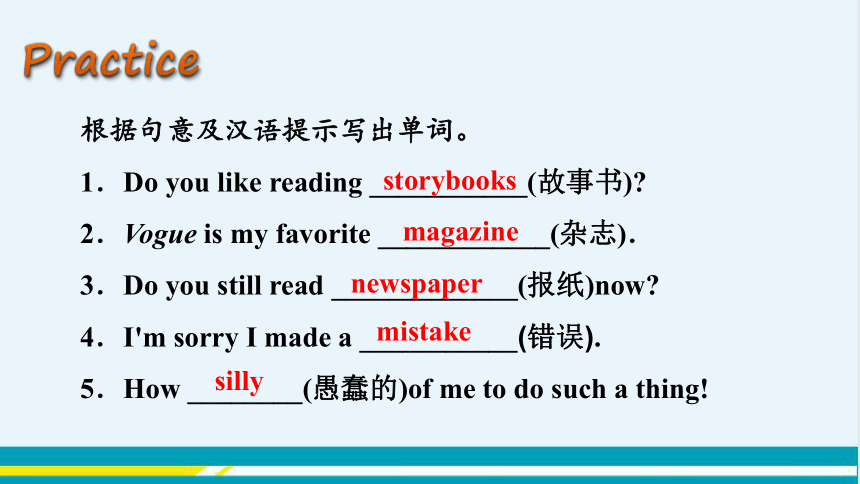
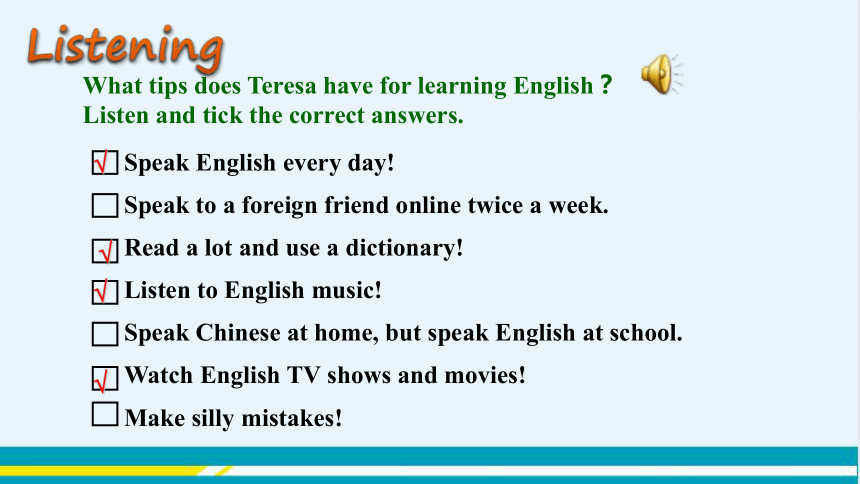
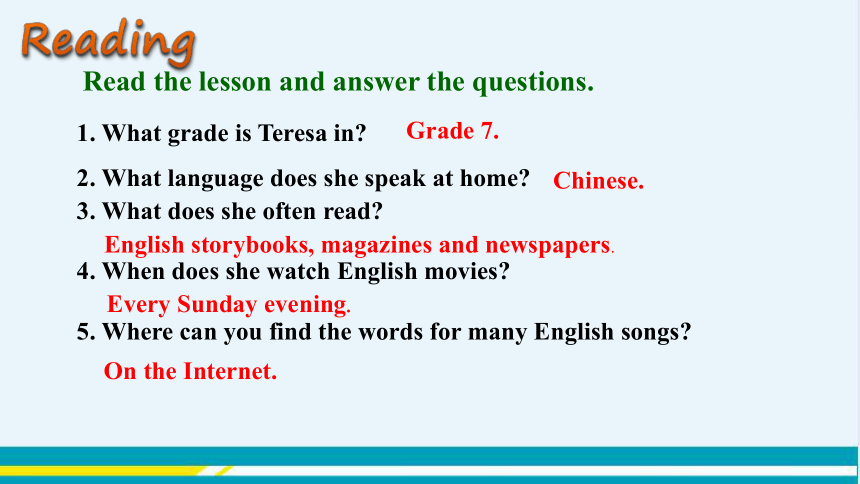
文档简介
(共24张PPT)
Lesson 28: How Do I Learn English
UNIT 5 I Love Learning English
学 习 目 标
掌握单词:magazine,newspaper,mistake,silly
接触单词:Hong Kong,storybook
短语:look up,enjoy oneself,in/after class, make a mistake/mistakes, laugh at, right now
句型: Don’t be afraid to make mistakes.
1
3
养成学生积极主动的学习态度,能大胆开口,积极参加各项学习活动,善于与同学交流。
用英语交流,养成用英语思维的良好习惯,提高学生的创造力和实践能力。
2
Do you like English
How do you learn English
Do you have any good tips to learn English well
Lead in
课 堂 导 入
English dictionary
English storybooks
English magazine
English newspaper
magazine / m ɡ zi n/
newspaper / nju z pe p /
mistake /m ste k/
silly / s l /
n. 杂志
n. 报纸
n. 错误
adj. 愚蠢的;傻的
New Words
课 堂 学 习
Practice
根据句意及汉语提示写出单词。
1.Do you like reading ___________(故事书)
2.Vogue is my favorite ____________(杂志).
3.Do you still read _____________(报纸)now
4.I'm sorry I made a ___________(错误).
5.How ________(愚蠢的)of me to do such a thing!
storybooks
magazine
newspaper
mistake
silly
What tips does Teresa have for learning English?Listen and tick the correct answers.
Speak English every day!
Speak to a foreign friend online twice a week.
Read a lot and use a dictionary!
Listen to English music!
Speak Chinese at home, but speak English at school.
Watch English TV shows and movies!
Make silly mistakes!
√
√
√
√
Listening
Read the lesson and answer the questions.
1. What grade is Teresa in
2. What language does she speak at home
3. What does she often read
4. When does she watch English movies
5. Where can you find the words for many English songs
Grade 7.
Chinese.
English storybooks, magazines and newspapers.
Every Sunday evening.
On the Internet.
Reading
Read the lesson again and find the following phrases and then translate them.
look up
enjoy oneself
at the same time
along with
in/after class
be afraid to do …
make mistakes/a mistake
laugh at
查找,查阅
玩得痛快,尽情享受
同时
和……一起
课上/下
害怕做……
犯错误
嘲笑,取笑
Reading
Read Teresa and Susan's phone conversation and fill in the blanks.
Teresa:Hello
Susan:Hi. Is this Teresa
Teresa:Yes, it is. Hi, Susan.Thanks for calling me back. I want
to go and watch a movie later. But I don't want to go
by ______. Do _____want to come with _____?
Susan:Sure.____ can come with ________. I will meet you
at the movie theatre. Can you get there by ________?
Teresa:Of course I can. I'll meet you there at 3:00 p.m.
Susan:Great!See you later.
myself
you
me
Speaking
I
you
yourself
How do your classmates learn English?Interview them and fill in the table.
Name How do you learn English?
Work in groups
I speak Chinese at home, but I speak English at school every day.
每天我在家说汉语,但在学校里说英语。
【辨析】speak、talk、tell与say
① speak 意为“说,讲”。该词不强调说的内容,主要用来指人们对语言的掌握或使用以及说的动作。其后常接表示语言的名词或用于短语 speak to sb.(和某人说话)以及电话用语中。That woman can speak French.那位女士会说法语。
Language points
② talk 意为“谈论”,一般用作不及物动词,着重指连续地说话或与人交谈。常用短语:talk to/with sb.与某人交谈;talk about sth.谈论某事。
What are you talking about?你们在谈论什么?
③tell 意为“告诉,讲述,吩咐”,经常用作及物动词,后面常跟双宾语和不定式的复合结构,即:tell sb. sth.= tell sb. about sth. 告诉某人某事;tell sb. (not) to do sth. 叫某人(不)做某事。
常用短语:tell a lie说谎;tell the truth说实话;tell a story 讲故事。此外,该词还可以表示识别或分辨事物。
He told us a story yesterday. 他昨天给我们讲了一个故事。
④say 意为“说”,是最普通的用语,着重指说的内容,通常作及物动词。其后可跟名词、代词或that从句。
What did you say just now?你刚才说了什么?
2. Here are some tips:这是一些建议:
这个句子使用了完全倒装结构。当表示地点的副词如here、there等位于句首,主语是名词的时候,句子就要采用谓语放在主语前面的完全倒装结构,即:There/Here+谓语+主语(名词)。如果主语是代词时,则不用倒装,即:There/Here+主语(代词)+谓语。
Here you are.给你。(主语是代词,不用倒装)
There comes the teacher.老师来了。(主语是名词,使用完全倒装)
3. Then I can sing along with the music.
然后我可以随着音乐唱歌。
along with意为“和······一起”,相当于together with。当along with后接名词或代词跟在主语之后时,谓语动词的数要跟along with前的主语在人称和数上保持一致。
I like to go shopping along with my friends.
我喜欢和朋友一起购物。
Our English teacher along with other teachers is working in the office. 我们的英语老师与其他老师正在办公室里办公。
4. Don't be afraid to make mistakes!
不要害怕犯错误!
(1)afraid作形容词,意为“害怕的”。常用短语:be afraid to do sth.害怕做某事;be afraid of sth.害怕某物;be afraid of doing sth.害怕做某事;I'm afraid+that从句 恐怕······;I'm afraid so/not恐怕是这样/恐怕不是这样。
Are you afraid of learning math?你害怕学数学吗?
I am afraid of snake very much. 我非常害怕蛇。
I am afraid that your answer is wrong. 恐怕你的答案是错的。
(2)mistake作可数名词,意为“错误”。常用短语:make mistakes=make a mistake犯错误;by mistake错误地
Sorry,I took your umbrella by mistake.
对不起,我错拿了你的雨伞。
Don't be afraid to make mistakes in learning anything.
不要害怕学习东西时犯错。
5. Sometimes I make silly mistakes and I laugh at
myself.有时我犯愚蠢的错误,我会自嘲一下。
(1)silly作形容词,意为“愚蠢的,傻的”。它修饰人时,主要是指某人由于缺乏常识、判断等而做出令人觉得愚蠢的行为或者举止。
Don't be silly. He is a dishonest man.
别傻了。他是个不诚实的人。
(2)laugh作动词,意为“大笑”。常用短语:laugh at嘲笑;can't help laughing 情不自禁地大笑。
It's impolite to laugh at others. 嘲笑别人是不礼貌的。
1. We learned some useful words and phrases.
2. We learned “Don't be ” structure.
Sum up
用所给词的适当形式填空。
1. Here ________ (be) some answers to your questions.
2. I can enjoy ___________ (me) by listening to Beijing Opera.
3. If he meets a new word, he can look it up in a dictionary ________ (he).
4. I practice __________ (speak) English after class every day.
5. —Can you ask her to come here _______ (late)
—Sure. I’ll tell her.
myself
are
himself
speaking
later
课 堂 达 标
1.Write a composition: How to learn English well
2.Finish the exercises of this lesson.
Homework
Thank you !
Lesson 28: How Do I Learn English
UNIT 5 I Love Learning English
学 习 目 标
掌握单词:magazine,newspaper,mistake,silly
接触单词:Hong Kong,storybook
短语:look up,enjoy oneself,in/after class, make a mistake/mistakes, laugh at, right now
句型: Don’t be afraid to make mistakes.
1
3
养成学生积极主动的学习态度,能大胆开口,积极参加各项学习活动,善于与同学交流。
用英语交流,养成用英语思维的良好习惯,提高学生的创造力和实践能力。
2
Do you like English
How do you learn English
Do you have any good tips to learn English well
Lead in
课 堂 导 入
English dictionary
English storybooks
English magazine
English newspaper
magazine / m ɡ zi n/
newspaper / nju z pe p /
mistake /m ste k/
silly / s l /
n. 杂志
n. 报纸
n. 错误
adj. 愚蠢的;傻的
New Words
课 堂 学 习
Practice
根据句意及汉语提示写出单词。
1.Do you like reading ___________(故事书)
2.Vogue is my favorite ____________(杂志).
3.Do you still read _____________(报纸)now
4.I'm sorry I made a ___________(错误).
5.How ________(愚蠢的)of me to do such a thing!
storybooks
magazine
newspaper
mistake
silly
What tips does Teresa have for learning English?Listen and tick the correct answers.
Speak English every day!
Speak to a foreign friend online twice a week.
Read a lot and use a dictionary!
Listen to English music!
Speak Chinese at home, but speak English at school.
Watch English TV shows and movies!
Make silly mistakes!
√
√
√
√
Listening
Read the lesson and answer the questions.
1. What grade is Teresa in
2. What language does she speak at home
3. What does she often read
4. When does she watch English movies
5. Where can you find the words for many English songs
Grade 7.
Chinese.
English storybooks, magazines and newspapers.
Every Sunday evening.
On the Internet.
Reading
Read the lesson again and find the following phrases and then translate them.
look up
enjoy oneself
at the same time
along with
in/after class
be afraid to do …
make mistakes/a mistake
laugh at
查找,查阅
玩得痛快,尽情享受
同时
和……一起
课上/下
害怕做……
犯错误
嘲笑,取笑
Reading
Read Teresa and Susan's phone conversation and fill in the blanks.
Teresa:Hello
Susan:Hi. Is this Teresa
Teresa:Yes, it is. Hi, Susan.Thanks for calling me back. I want
to go and watch a movie later. But I don't want to go
by ______. Do _____want to come with _____?
Susan:Sure.____ can come with ________. I will meet you
at the movie theatre. Can you get there by ________?
Teresa:Of course I can. I'll meet you there at 3:00 p.m.
Susan:Great!See you later.
myself
you
me
Speaking
I
you
yourself
How do your classmates learn English?Interview them and fill in the table.
Name How do you learn English?
Work in groups
I speak Chinese at home, but I speak English at school every day.
每天我在家说汉语,但在学校里说英语。
【辨析】speak、talk、tell与say
① speak 意为“说,讲”。该词不强调说的内容,主要用来指人们对语言的掌握或使用以及说的动作。其后常接表示语言的名词或用于短语 speak to sb.(和某人说话)以及电话用语中。That woman can speak French.那位女士会说法语。
Language points
② talk 意为“谈论”,一般用作不及物动词,着重指连续地说话或与人交谈。常用短语:talk to/with sb.与某人交谈;talk about sth.谈论某事。
What are you talking about?你们在谈论什么?
③tell 意为“告诉,讲述,吩咐”,经常用作及物动词,后面常跟双宾语和不定式的复合结构,即:tell sb. sth.= tell sb. about sth. 告诉某人某事;tell sb. (not) to do sth. 叫某人(不)做某事。
常用短语:tell a lie说谎;tell the truth说实话;tell a story 讲故事。此外,该词还可以表示识别或分辨事物。
He told us a story yesterday. 他昨天给我们讲了一个故事。
④say 意为“说”,是最普通的用语,着重指说的内容,通常作及物动词。其后可跟名词、代词或that从句。
What did you say just now?你刚才说了什么?
2. Here are some tips:这是一些建议:
这个句子使用了完全倒装结构。当表示地点的副词如here、there等位于句首,主语是名词的时候,句子就要采用谓语放在主语前面的完全倒装结构,即:There/Here+谓语+主语(名词)。如果主语是代词时,则不用倒装,即:There/Here+主语(代词)+谓语。
Here you are.给你。(主语是代词,不用倒装)
There comes the teacher.老师来了。(主语是名词,使用完全倒装)
3. Then I can sing along with the music.
然后我可以随着音乐唱歌。
along with意为“和······一起”,相当于together with。当along with后接名词或代词跟在主语之后时,谓语动词的数要跟along with前的主语在人称和数上保持一致。
I like to go shopping along with my friends.
我喜欢和朋友一起购物。
Our English teacher along with other teachers is working in the office. 我们的英语老师与其他老师正在办公室里办公。
4. Don't be afraid to make mistakes!
不要害怕犯错误!
(1)afraid作形容词,意为“害怕的”。常用短语:be afraid to do sth.害怕做某事;be afraid of sth.害怕某物;be afraid of doing sth.害怕做某事;I'm afraid+that从句 恐怕······;I'm afraid so/not恐怕是这样/恐怕不是这样。
Are you afraid of learning math?你害怕学数学吗?
I am afraid of snake very much. 我非常害怕蛇。
I am afraid that your answer is wrong. 恐怕你的答案是错的。
(2)mistake作可数名词,意为“错误”。常用短语:make mistakes=make a mistake犯错误;by mistake错误地
Sorry,I took your umbrella by mistake.
对不起,我错拿了你的雨伞。
Don't be afraid to make mistakes in learning anything.
不要害怕学习东西时犯错。
5. Sometimes I make silly mistakes and I laugh at
myself.有时我犯愚蠢的错误,我会自嘲一下。
(1)silly作形容词,意为“愚蠢的,傻的”。它修饰人时,主要是指某人由于缺乏常识、判断等而做出令人觉得愚蠢的行为或者举止。
Don't be silly. He is a dishonest man.
别傻了。他是个不诚实的人。
(2)laugh作动词,意为“大笑”。常用短语:laugh at嘲笑;can't help laughing 情不自禁地大笑。
It's impolite to laugh at others. 嘲笑别人是不礼貌的。
1. We learned some useful words and phrases.
2. We learned “Don't be ” structure.
Sum up
用所给词的适当形式填空。
1. Here ________ (be) some answers to your questions.
2. I can enjoy ___________ (me) by listening to Beijing Opera.
3. If he meets a new word, he can look it up in a dictionary ________ (he).
4. I practice __________ (speak) English after class every day.
5. —Can you ask her to come here _______ (late)
—Sure. I’ll tell her.
myself
are
himself
speaking
later
课 堂 达 标
1.Write a composition: How to learn English well
2.Finish the exercises of this lesson.
Homework
Thank you !
同课章节目录
- Unit 1 A Trip to the Silk Road
- Lesson 1 A Trip to China
- Lesson 2 Meet You in Beijing
- Lesson 3 A Visit to Xi'an
- Lesson 4 A Visit to Lanzhou
- Lesson 5 Another Stop along the Silk Road
- Lesson 6 Jenny's Diary
- Unit 2 It's Show Time!
- Lesson 7 What's Your Project about?
- Lesson 8 Marco Polo and the Silk Road
- Lesson 9 Danny's School Project
- Lesson 10 Music and Dance
- Lesson 11 Food in China
- Lesson 12 A Blog about the Silk Road
- Unit 3 School Life
- Lesson 13 How Is School Going?
- Lesson 14 Jenny's School Life
- Lesson 15 Making a Difference
- Lesson 16 We Are with You!
- Lesson 17 School Science Fai
- Lesson 18 Teaching in China
- Unit 4 After-School Activities
- Lesson 19 A Dinner Date
- Lesson 20 Join Our Club!
- Lesson 21 What Is Your Club Type?
- Lesson 22 Big Plans for the Weekend
- Lesson 23 A Weekend with Grandma
- Lesson 24 How was Your Weekend?
- Unit 5 I Love Learning English!
- Lesson 25 A Phone Friend
- Lesson 26 Online Phone Calls
- Lesson 27 Amazing English
- Lesson 28 How Do I Learn English?
- Lesson 29 A Door to the World
- Lesson 30 Writing an E-mail in English
- Unit 6 Seasons
- Lesson 31 What Strange Weather!
- Lesson 32 I Can't Wait for Winter!
- Lesson 33 Kim's Favourite Season
- Lesson 34 Steven's Report
- Lesson 35 Surfing in Sydney
- Lesson 36 Spring in China
- Unit 7 Sports and Good Health
- Lesson 37 You Are What You Eat!
- Lesson 38 Stay Healthy!
- Lesson 39 Danny's Report
- Lesson 40 Move Your Body
- Lesson 41 Were People Healthy Then?
- Lesson 42 Know Yourself
- Unit 8 Summer Holiday Is Coming!
- Lesson 43 Have a Good Summer!
- Lesson 44 Volunteering in Summe
- Lesson 45 Baseball Season
- Lesson 46 Get Ready for Summer Holiday!
- Lesson 47 Summer Plans
- Lesson 48 Li Ming's Summer Holiday
